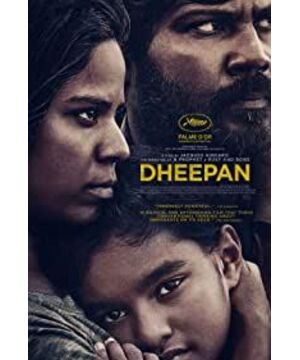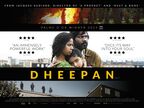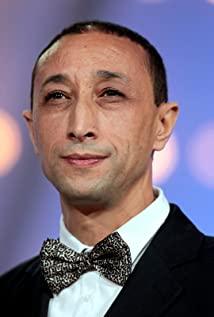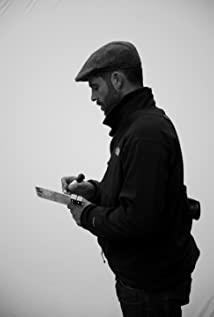Recently, the competition list of the Cannes Film Festival was announced, and a Cannes fever will sweep the attention of the global film industry. Coincidentally, last year's Cannes Palme d'Or film "Song of the Displaced", recently It's just released while it's hot!
As the base of film art, the Cannes Film Festival has won the Palme d'Or, the highest honor, in the past few years. "Winter Awakening", "Blue is the Warmest Color", and "Love · Mu" are well-known, until last year. On the iron plate, the most popular pre-match "Assassin Nie Yinniang", "Because I Love You", and "Son of Sol" were all defeated. In the end, France's own favorite Jacques Odia "Song of the Displaced" attacked. The laurels that have been left in the history of the youth have also attracted a lot of doubts about protecting the short.
For domestic audiences, the dream of the Palme d'Or, which is so thirsty and imminent, has come to nothing. It is as disgusting as "The Wedding Banquet" and "Farewell My Concubine" when they braved the Oscar Arena and accidentally lost to "The Lover of Four Thousand Gold". , It is conceivable that the sour complex of "prove that it is not as good as "Assassin Nie Yinniang" after this film is finally released after a year is probably more than the substantive expectation of aesthetics.
Fortunately, "Song of the Outcasts" has an unusual and unpretentious start—unpretty means that it doesn't present beautiful dishes to please Wen Qing's eye. Following this great atmosphere, the movie itself should satisfy the "acid addiction" of domestic fans.
A boy and a girl from Sri Lanka. Three refugees, who were killed by non-relatives and non-accomplices, accidentally joined three passports to form a family. This fake family, surnamed Dipan, which is the original film title - the name "Dipan" neither exists nor exists. To put it bluntly, it is a foreigner who has lost his roots in a troubled world, a fake surname that he relies on to survive.
Straight to the point, a scene in which a fake passport is exchanged for a new identity is straightforward and the scene is not surprising. Stepping into the French territory, slowly, through the hero and heroine for food and clothing, put on new identities as caregivers, and unknowingly strayed into the territory of gang drug lords - a super community that accommodates criminal transactions. In this field of existence with a narrow perspective, folded in half and folded in half, the so-called bright future that they were looking forward to in their eyes is also blurred and distorted...
Last year, there was a news clip that everyone must still remember. A cold-blooded Hungarian female reporter stretched her legs and tripped the Syrian refugee father and son. The outrageous behavior was expected to arouse a global outrage filled with righteous indignation. This proves that any issue is valid.” After being embodied", the "Wrath" obtained from the multiplication, the power can still be far and wide.
Jacques Odiya chose the theme of "Song of the Displaced", although it echoes the contemporary international focus of refugees defecting to Europe, but the film itself does not indulge in exaggerating the scenes of conflict and poverty. To put it bluntly, in this era of information explosion and the proliferation of video streaming, the issue of refugees moving to Europe, in the eyes of you and me, who lack a basic understanding of the underlying causes, may be more misjudgments on the fly—that is, as a movie audience , the current situation of poverty and disease in Africa is far more likely than that of European refugees to immediately hit the lacrimal glands of you and me.
In other words, when you want to make a refugee movie, "sensation" may be a primary means - it doesn't matter, package it a little better, we call it "moving" and "moving". As a world-class film festival award-winning work, if you expect it to be "moving", "Song of the Displaced" is undoubtedly disappointing.
Jacques Odiya framed his ambition to loosen the boundary of "realism/fantasy". He first told us that "moving" does not have to be the obligation or purpose of a movie, and he used a color system that we may not be familiar with to weave. Just a mysterious organization. This kind of organizational network does not necessarily rely on black market transactions and a hail of bullets to reflect the anger of the protagonist and force the plight of the protagonist. To put it bluntly, using such a "peculiar organization" to run through the realistic "social problem" of refugees is extremely unpleasant, and may even be criticized as a mere "cheap".
However, he is also very good at the scene scheduling. Several dialogue scenes between the heroine and the drug lord's employer, coupled with an intriguing electronic fetter, dialectical "freedom" and "dilemma" in an incisive and charming way. The kind that approaches drug lords and parasitizes on sin is more and more visible. It is not difficult for you and me on the other side of the earth to find sympathy for the contradiction of its goodness.
At the climax of the latter part of the film, the male protagonist drives a passenger car and goes straight into the small battlefield where the drug lord is in power. At this time, the hail of bullets led to the metamorphic "firework imagery". To "provide" some kind of peculiar redemption by instigating the scent of fantasy.
Yes, I used the word "supply" which corresponds to "refugee".
Jacques Odia horizontally extends the interpretation of the word "dilemma" in the previous work "The Great Prison Talker". There are no handsome men and beauties, and there is no easy hand-to-hand combat. This time, his advantage is not as good as that of "The Great Prison Talker", but his rough surface still has the luster of humanity.
I really want to say that the biggest technical mistake is the acting of a child star girl. She failed to play the function of threading the needle. The mistakes in several scenes caused unavoidable damage to the whole. It
happened that I chatted with other netizens at the film club a few days ago. In John Schlesinger's "Midnight Cowboy", someone mentioned the passage where the hero John Walter was raped by a gangster when he was young. I was confused for a while: "I don't remember this part!" When I got home, I took out the film and quickly After searching, I saw the black and white clips that were deliberately bold but not profound, and barely recovered a little memory - quite psychedelic, a bit like the hippie masterpiece "Easy Rider" of the same year. However, this move is shocking from the perspective of the 1960s, but it is far less than Dustin Hoffman impromptuly stopped a taxi and cursed: "I walk here, man!"
Also, years later, what we remember is "Song of the Outcasts" showing off those camera positions and moving closer to those models? Or forget that deep sad tune?
Compared with the previous Palme d’Or classics “Taxi Driver” and “Apocalypse Now”, which were instantly in line with the surly spirit of the times, “Song of the Displaced” is not a movie that you can quickly find a location for. It is not so refugee. Refugees, compassion is not so mainstream, it is understandable to be overwhelmed when the award is revealed.
Some people say that the Chinese title of "Song of the Displaced" is not well-received, but I feel that it slants the deliberately passionate melody of the film, and how ordinary pain can be sung into a dirge. You can even say that because you have suffered, you are qualified to put the bitterness in your mouth into a song.
Looking at the film festival ecology, the peak significance of the Palme d'Or is often cast in wrong expectations. For example, it is well known that Hannek's two Palme d'Or works cannot surpass the previous works in the sense of creation! That's right, "Song of the Outcast" doesn't really matter, and most people don't even think it's as good as Jacques O'Dea's past works. However, a "work" does not take aesthetics as the commanding height, and the director has his own measure. In any case, this film does find a special angle, which effectively reflects the corner of the soul where the refugees go to the rich and have no worries about food and clothing but lack of appetite. The pain of the well-dressed root is not the pain of blood that will never go away!
View more about Dheepan reviews











